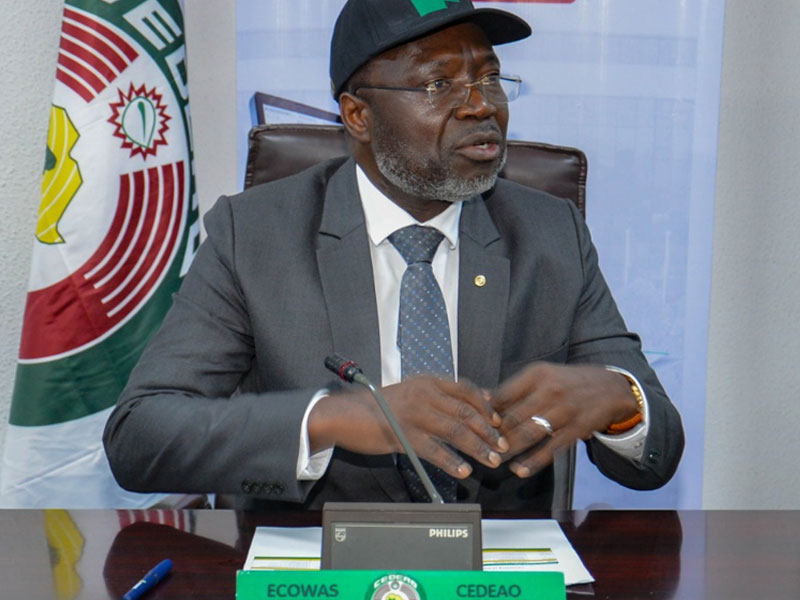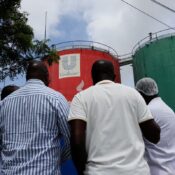
Gulf of Guinea Piracy and Armed Robberies Have Declined, Says President of the ECOWAS Commission Touray
Omar Touray, President of the ECOWAS Commission, reports that piracy in the Gulf of Guinea has been declining.
The number of armed robberies and pirate attacks in the Gulf of Guinea has been declining throughout the year, according to Dr. Omar Touray, President of the ECOWAS Commission.
He emphasized that the Inter-regional Coordination Center, or ICC, is to be commended for its accomplishments in marine security in the Gulf of Guinea, noting that this was made possible by their efforts.
Touray disclosed this during the 4th Annual Meeting of the Heads of Institution (HOI) of the ICC, which took place on Thursday at the Abuja headquarters of the ECOWAS Commission.
Following the 2013 Yaoundé Summit of ECOWAS, ECCAS, and GGC Heads of State and Government, the International Convention on Climate Change (ICC) was established in September 2014 by ECOWAS, the Economic Community of Central African States (ECCAS), and the Gulf of Guinea Commission (GGC) with the purpose of acting as the Coordination Center on maritime security in the Gulf of Guinea.
“Since the Political Declaration of our Heads of State, substantial progress has been made in our maritime community,” Touray stated in his speech on Thursday.
This included the implementation of vital marine infrastructure that has enhanced maritime situational awareness as well as the adoption of national maritime strategies.
“The governing body has made some headway toward inter-institutional collaboration in relation to our Memorandum of Understanding.
“The Coordination Center is financed, and the Maritime Operational Centers’ operations are included in the annual Work Plan and Budget that are approved.”
Touray continued, pointing out that numerous development partners were interested in the ICC and that its significance for international maritime security and safety could not be wished away.
He mentioned the European Union, the German Federal Government, the Chinese Government, and the G77++ Friends of the Gulf of Guinea for their many forms of support and assistance.
“With three Multinational Maritime Coordination Centres (MMCC) in Cotonou (Zone E), Accra (Zone F), and Praia (Zone G), we have successfully established the ECOWAS Regional Maritime Security Centre (CRESMAO) in Abidjan thanks to their assistance,” he stated.
Likewise, the Multinational Maritime Coordination Centers in Douala (Zone D) and Luanda (Zone A) as well as the Regional Centre for Maritime Security in Central Africa (CRESMAC) at Pointe Noire were formed by the ECCAS Maritime Security Architecture.
“Information sharing and situational awareness have improved with the establishment of maritime information sharing networks between ECOWAS and ECCAS.”
The International Maritime Bureau (IMB) reports that actual and attempted piracy and sea robbery incidents saw a downturn trend from 31 in 2015, 18 in 2021, and 15 in 2022. Touray noted that the Gulf of Guinea has continued to witness a downward trend in these types of attacks.
In the Gulf of Guinea, there were just six instances of armed robbery and piracy in the first quarter of 2024. We are grateful for our collaborative answers and institutional initiatives for this.
However, Touray said that despite these admirable advancements, the ICC had significant difficulties, such as a lack of hiring important personnel, erratic funding, and disruptions to vital services.
He emphasized that it was critical to take proactive measures to resolve the obstacles, saying that a regular assessment of the Declaration’s implementation’s status and obstacles was still necessary.
“Three years after its approval in Yaoundé in 2013, the Code of Conduct on the Prevention and Suppression of Acts of Piracy, Armed Robbery Against Ships and Illicit Maritime Activities in West and Central Africa was meant to become a legally enforceable agreement.
As the Yaoundé process is celebrating its tenth anniversary, we have not yet succeeded in achieving this. Therefore, it is crucial that we evaluate our institutional reactions to the Code of Conduct seriously,” the speaker stated.
Touray encouraged the Yaoundé Architecture Regional Information Sharing (YARIS) tool and a new EU initiative called “Safe Seas” for the area to be reviewed by the ICC governing body, which is made up of the Presidents of the ECOWAS and ECCAS Commissions as well as the Executive Secretary of the GGC.
Additionally, he urged member nations to simplify partnerships and development businesses so that the ICC could give the required oversight to direct the Coordination Center.
Speaking as well, Jose Abeso, the Executive Secretary of the Gulf of Guinea Commission, emphasized that the goal was to eradicate all types of criminal activity in the area and that the region was still dealing with issues related to marine insecurity.
He stated that in order to serve as effective disincentives against committing such crimes, the laws pertaining to criminal activity in the maritime sector in the Gulf of Guinea should be harmonized.
“The next frontier for our nations’ sustainable economic growth is the marine sector.
According to Abeso, “our governments cannot and should not leave the management of institutions meant to patrol this area to third parties in order to ensure that security and safety of activities are not left to chance.”
Gilberto Verissimo, President of the Commission of the Economic Community of Central African States (ECCAS), was present at the ceremony.
The UN Regional Office for Central Africa (UNOCA) and the UN Office for West Africa and Sahel (UNOWAS) representatives were among the others.
All Categories
Recent Posts
Tags
+13162306000
zoneyetu@yahoo.com


